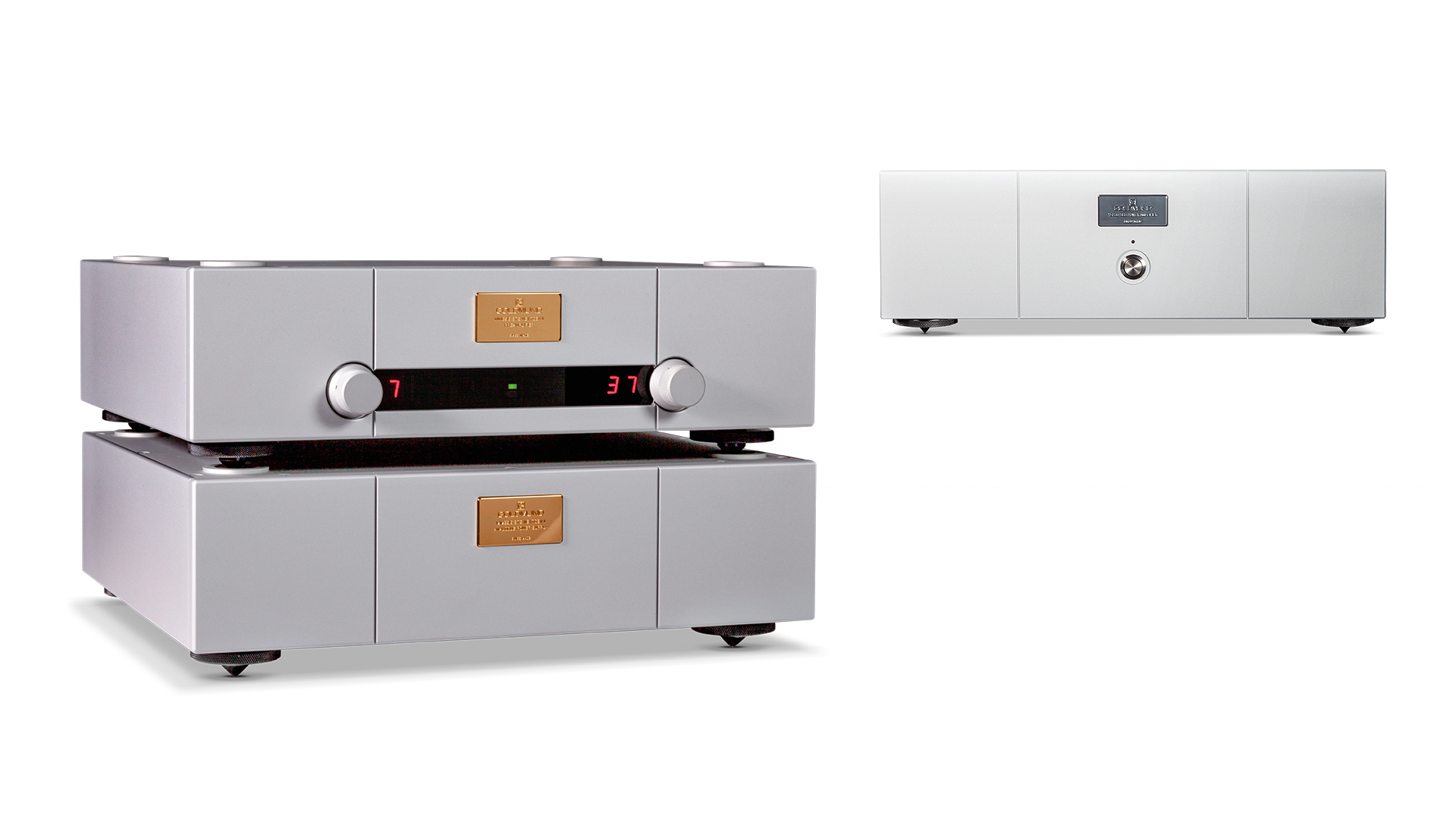
Goldmund lives in rarefied territory when it comes to the world of high-end hi-fi. This Mimesis 37S NextGen/Telos 300 combination is ferociously expensive, yet represents only the second rung on the Swiss company’s pre/power ladder. What do you get for all that money? The answer is carefully developed, beautifully built yet understated products that shoot for the stars and get way closer than most.
The Mimesis 37S NextGen preamplifier is the brains of this pairing. It comes in two chunky boxes; one houses the sensitive audio circuits while the other is home to the hefty power supply. This divide-to-conquer approach is sensible given that power supplies have high current flow and can generate unwanted magnetic fields and plenty of vibration. Such things will tend to spoil all aspects of the unit’s sonic performance if left unchecked.
This Goldmund preamp is a focused design aiming for the ultimate in performance, so it comes as no surprise that the feature count is limited. If you want to play records or connect a pair of headphones, you’re out of luck. The Mimesis 37S NG has neither a phono stage nor a headphone output, so you will have to buy outboard boxes that do the job. Such features, even when implemented with care, can easily adversely affect absolute sound quality, so justifying their exclusion.
Build
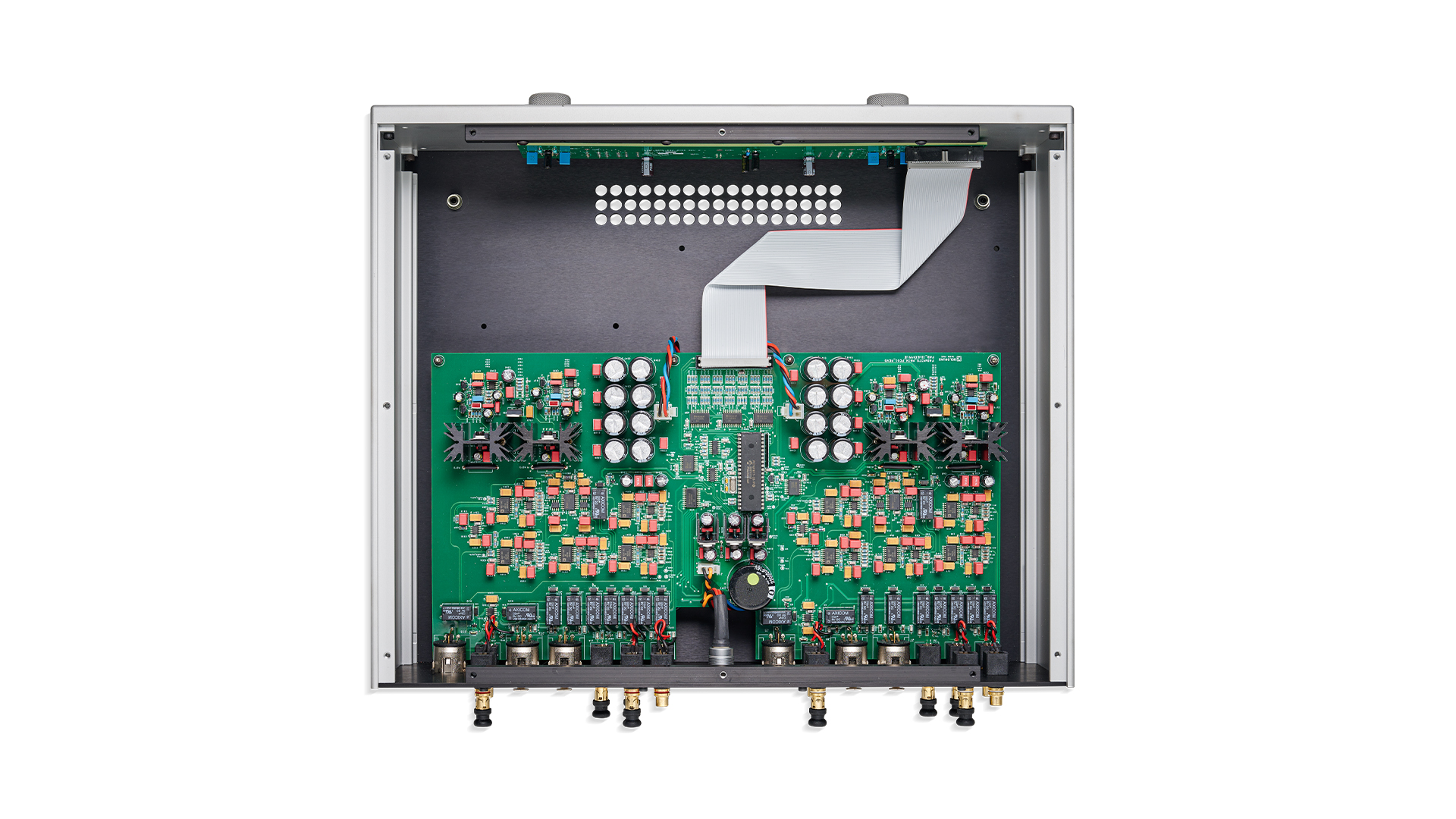
The preamp’s casework fits together with precision and the general attention to detail is impressive. Goldmund is big on the structural properties of the casework it uses, paying a great deal of attention to mechanically grounding any unwanted vibrational energy. This approach allows the electronic boards a better chance to perform at their optimal level.
Take the preamp’s lid off and you’ll find an immaculately constructed unit. The audio circuits are laid out in a neat dual-mono arrangement where any interaction between the channels is minimised. On paper, this type of design should help all aspects of the performance from stereo imaging to detail resolution. Goldmund’s amplifier design ethos has long centred around high bandwidth circuits with special attention paid to minimising group delays and time distortion. These priorities remain intact here.
There is a good choice of inputs – five single-ended and two balanced XLR – so this amplifier shouldn’t be caught short in even the most complex of stereo systems. Overall, the Mimesis 37S NG is a simple device to use, with just the input selector and volume dial on the front panel flanking a clear but basic display. Alternatively, you can use the rather nice metal remote handset but, either way, it is a fuss-free experience. The controls have a nice, crisp feel to them, giving the impression of a carefully engineered unit.
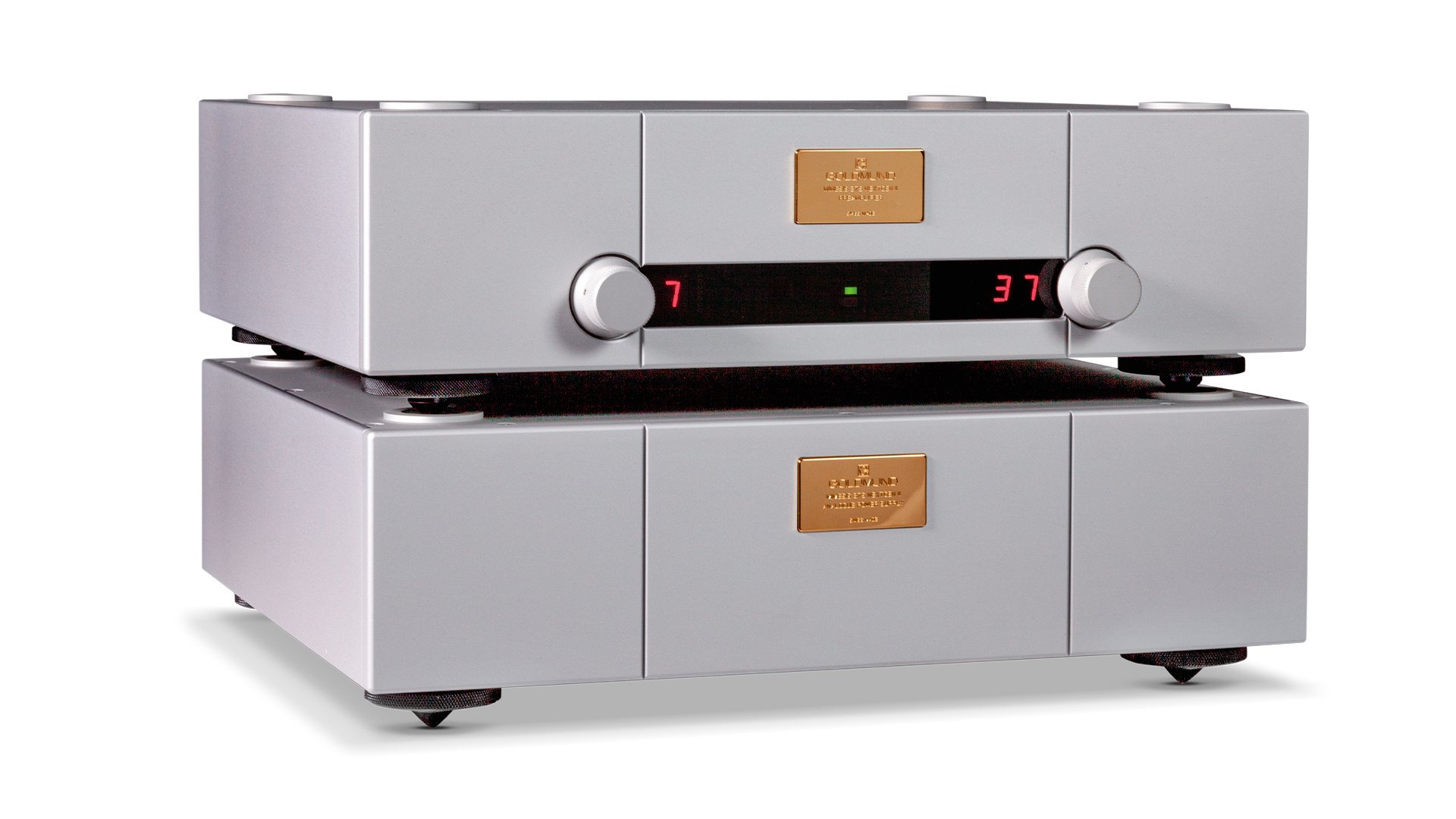
Type Pre/power
Inputs Single-ended RCA x5, balanced XLR x2
Phono stage? No
Remote control? Yes
Headphone output? No
Power output 225 watts per channel
Dimensions (hwd) Mimesis 37S NextGen preamp: 135 x 440 x 400mm / Mimesis power supply: 135 x 440 x 385mm / Telos 300 stereo power amplifier: 155 x 440 x 404mm
Weight Mimesis 37S NextGen preamp: 9kg / Mimesis PSU: 12kg / Telos 300: 15kg
Look past its understated appearance and you’ll find that the Telos 300 power amplifier is something of a beast. It has enough poke to drive pretty much any speaker on the market to high volume levels. So unless you have a listening space the size of an aircraft hangar, we suspect the claimed power output of 225 watts per channel into 8 ohms should be fine. If it isn’t, Goldmund’s range is packed full of more muscular (and more expensive) alternatives. Connectivity is limited to a choice of balanced and single-ended inputs, and just a single pair of rather nice multi-way speaker terminals.
Neither of these Goldmund units gets particularly hot during use, but there isn’t any harm in making sure that there is plenty of ventilation space around them so that overheating never becomes an issue.
We’re pleased with just how relatively unostentatious these products are. Most rivals go all out to impress with extravagant cosmetics and plenty of bling. After all, we’re talking about huge price tags, and quite a lot of customers will want something to show off to their friends. That isn’t what these products are about. Everything from the immaculately laid-out circuit boards and superbly made casework to the simple metal remote handset speaks of high-quality, unpretentious engineering. This is about substance not show. We approve.
Compatibility

Any amplifier at this level positively demands a high-quality partnering system. Our sources are Naim’s ND555/555 PS DR music streamer and the Technics Sl-1000R/Kiseki Purpleheart MC record player. Since the Mimesis 37S NG doesn’t have a phono stage we use the Cyrus Phono Signature and the partnering PSX-R2 power supply. As for speakers, we have our usual reference ATC SCM50 to hand as well as Wilson Benesch’s talented A.C.T. 3Zero floorstanders. Our cables are high-end offerings from Chord Company and Vertere Acoustics.
Given the sound quality potential here, it pays to take care with the installation. A top-quality dedicated equipment rack is a must. It should be solid, low-resonance and ideally of high mass. Keep the two sections of the preamp as far from each other as possible to minimise any unwanted interactions, and whatever you do, never stack them. Do so and you’ll never hear just how glorious this amplifier pairing can sound; the presentation loses transparency and dynamics lack their usual expressiveness. This is also a case where good audio housekeeping will pay rich dividends. Keep your mains leads away from the system’s signal cables, particularly from the lead that links the two sections of the preamp together.
Yet, even doing all of this, you still may not get great results. At this level, the best products are just so revealing and transparent that any lack of system synergy is readily apparent. To ensure the best results good system building is imperative. This is a case where a knowledgeable dealer and a home demo are essential.
Sound
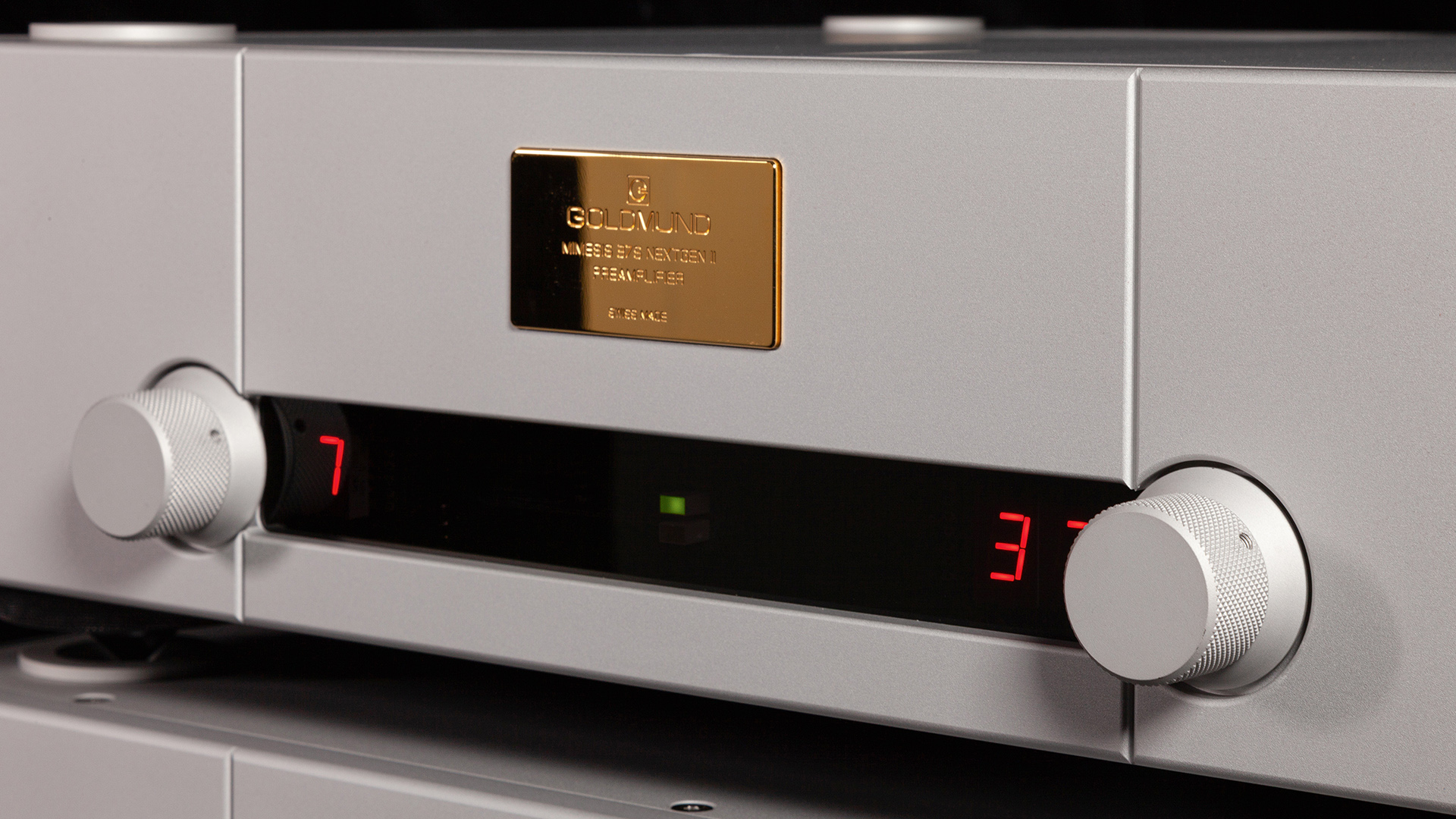
Get it right and you’ll be treated to a wonderfully persuasive performance from this Goldmund pairing. They don’t have a strong sonic signature (which is good) and simply let the character of the partnering equipment shine through.
Hone in on the amplifier’s sound and you’ll find its talents start with a lovely, even tonal balance. If poorly partnered we can understand if people find them a little lean, but take a bit of care with system matching and they can sound impressively neutral. Rather than imprinting a specific character on the presentation, these Goldmunds seem happy to allow the natural warmth and richness of instruments to shine through.
We listen to Dave Brubeck’s Take Five and are mesmerised by the convincing way this pairing renders instrumental textures. There is just so much detail here and all that information is organised in a cohesive and musical way. Initially, we thought that the Goldmunds sounded a little too controlling as if they were unwilling to give the energy in the music free reign, but over time that feeling fades, leaving the impression of a free-flowing and expressive performer that does just what the music demands.
There is a confidence-inspiring sense of composure here that gives the listener the security to know that no matter how complex or demanding the music, this is a combination that won’t struggle to keep up. It is something that helps us relax and just enjoy the track being played.
As we listen to Beyoncé’s Lemonade set, we’re taken by her passionate performance on Pray You Catch Me; the way this amplifier captures the dynamic nuances in her delivery is spine-chilling (in a good way). Equally, when we move on to All Night Long, the Goldmunds thump out the song’s beat with ferocity. This pairing is rhythmically accomplished without ever sounding like it is emphasising the point. They don’t go out of their way to sound exciting unless the music demands it. This gives them a wonderfully natural and transparent feel.
We switch to Bizet’s Carmen Suite and the Goldmunds have no trouble delivering a sound of impressive scale and authority. The music’s dramatic dynamic sweeps come through forcefully and without losing track of low-level instrumental strands. Stereo imaging is expansive, extending well beyond the outside edges of our speakers. The stability of that stereo image is excellent as is the way this pairing focuses and layers the soundstage. This is a complete performance.
Our time with this Goldmund pairing is a blur of music. We move from Beethoven’s Symphonies to De La Soul’s rich back catalogue then to Bruce Springsteen’s early work, and never do the Goldmunds sound lacking or out of their comfort zone. These are excellent all-rounders that are balanced enough to treat all types of music well. That’s not as common a trait as it should be, even at this elevated level.
Verdict
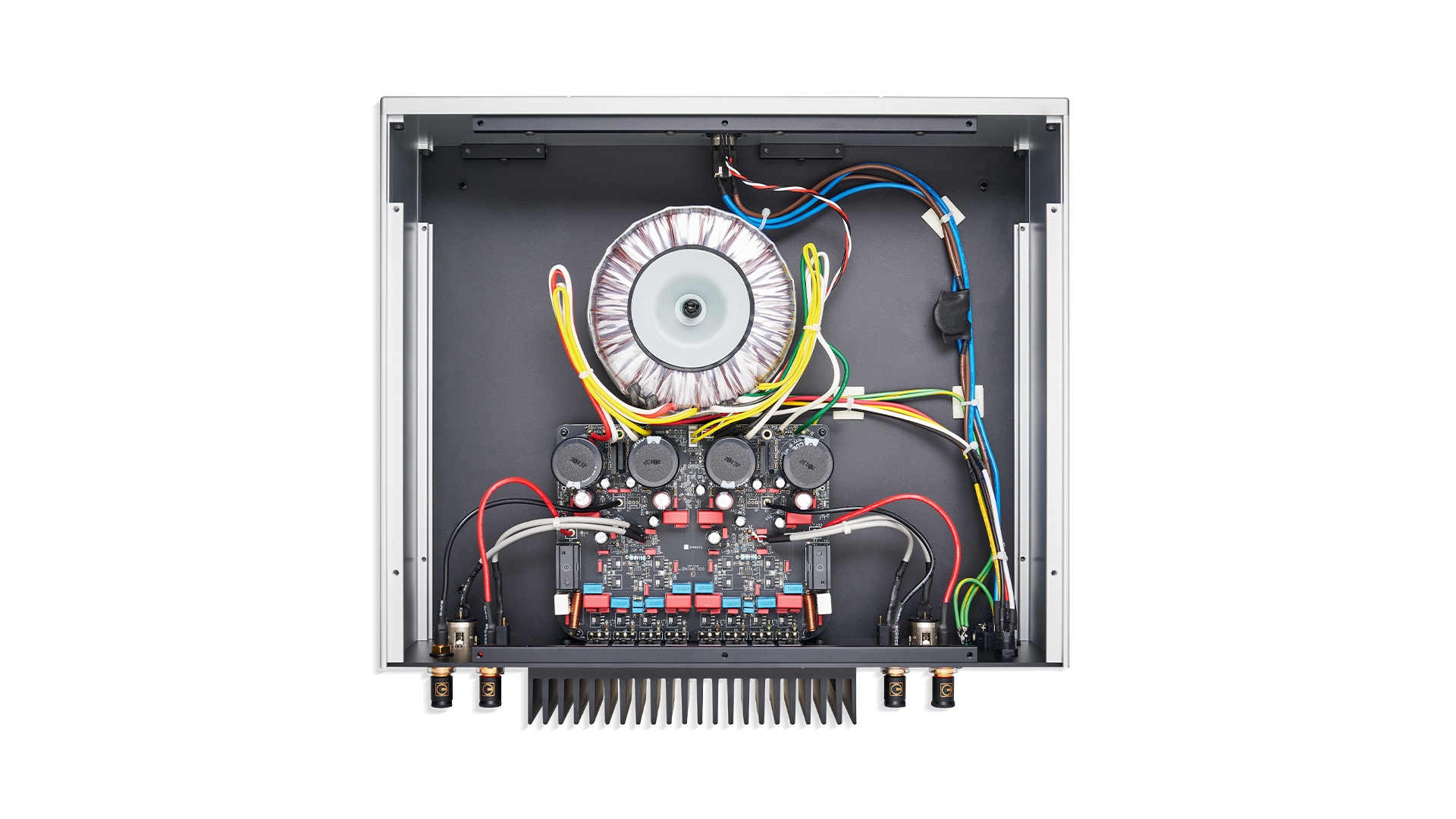
Some people will never get past the price of this understated pairing and we can understand that view. But, if that isn’t an issue for you, there is so much to admire here. When it comes to transparency and resolution these are right up there with the best we’ve heard. So whether these Goldmunds are within your budget or not, we’re just glad that products this good exist.
SCORES
- Sound 5
- Build 5
- Features 3
MORE:
Read our review of the Burmester 088/911 MkIII
Also consider the Goldmund Telos 590 Next Gen II
Read our Dan D’Agostino Progression integrated review







